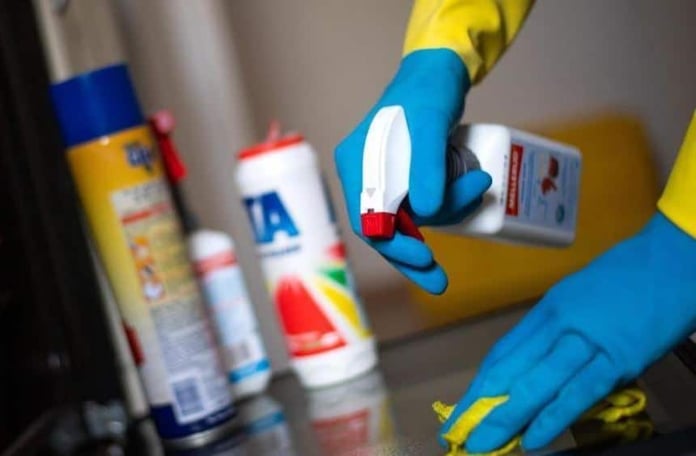
Nuremberg (TEH) – At the moment we are forced to spend a lot of time at home – and suddenly some notice how dirty everything is.
Spider webs hang in the corners, doors, and windows are covered with greasy fingerprints, the dust mice collect under the beds and chip residues in the cracks in the sofa.
It is high time for a thorough spring cleaning: we want it to be as beautiful and cozy as possible in our area. And health also benefits from it. But why do we maintain the custom of spring cleaning? A search for traces:
SINN: “A clean home is always important, for allergy sufferers and people with weak defenses, but also for healthy people,” says Heinz-Jorn Moriske from the Federal Environment Agency in Dessau-Rosslau. According to his information, toxins and microorganisms such as fungi and bacteria can stick to the dust. Because of the corona pandemic, it is currently particularly important to regularly wipe door handles and frequently touched surfaces and to ventilate them daily. “It is a misconception to think that when you ventilate, you carry viruses from the outside into your home, on the contrary, ventilating helps to carry away any viruses that may have sneezed outside before others get infected in the household,” emphasizes the environmental hygienist.
STRESS: In normal everyday life, we do not come to cleaning as often as is actually necessary – and are ashamed when visitors come for the layer of dust on the bookshelf and the many crumbs under the dining table. “There is a lot of pressure from outside,” says Brigitte Less from the Federal Association of Housekeeping Professions in Bad Schmiedeberg in Saxony-Anhalt. What should the neighbors say, what the mother-in-law? Recently, relatives have been hearing how practical a vacuum cleaner robot is. A hint with the fence post?
TOOLS: 4 percent of German households had their floors vacuumed by intelligent robots last year, according to a representative survey by the digital association Bitkom. The previous year it was 2 percent. And spending on cleaning and cleaning agents also rose slightly last year, according to the Nuremberg market research institute GfK, to an average of around EUR 34.18. As in the previous year, the largest sales were recorded in the first three months. However, the experts cannot say whether there is a connection with the spring cleaning.
NEED: According to the author Linda Thomas, cleaning up after the winter has a long tradition in many cultures. For Jews and Christians, this is a symbol of a new beginning before Easter. “The Chinese have also been cleaning their houses thoroughly in the spring for millennia in order to free them from the demons that live in the dust,” says Thomas, who has written several books on cleaning. Even today, many still felt the impulse to free themselves from cobwebs, dust, and dirt in the first sunny days. “Clearing out, tidying up and cleaning are tried and tested means of getting back on track internally.”
GENDER DISTRIBUTION: A lot of housework accumulates over the months, especially in families with young children. Cleaning can become pure stress: As soon as the floors are vacuumed and wiped, the little ones carry sand mountains back in from the playground. “Spring cleaning can be a psychological burden,” Less knows. For the women. Because in her experience, spring cleaning – like the household as a whole – mostly sticks to women, although many of them work just like men. “There is still the traditional role model,” she says.
In her practice in Bad Nauheim, Hesse, psychologist Cornelia van den Hout looks after many young women who are overwhelmed by their everyday lives. “Women are under a lot more pressure today. They want to be perfect, but that’s what they are expected to do, ”she says. “They put their needs behind, they just work.” Above all, the psychologist helps them break out of the hamster wheel of work, household and childcare, and set priorities. Say: leave the mop in the corner and prefer to use the time for yourself.
DEAR SELF: According to a study carried out by the Institute of German Business in Cologne on behalf of the Minijob headquarters last autumn, Generation X, i.e. those born between 1965 and 1980, is currently under pressure. They spend 11.5 hours a day on work, household and children. Although this means that they have little free time, the study found that only 7 percent employed domestic help. However, the number of unreported cases is high. Around 300,000 household helpers are currently registered with the mini job center, says Wolfgang Buschfort from the German Pension Insurance Association Knappschaft-Bahn-See, to which the mini job center belongs. In addition, there would be around 500,000 registered professionals. “An estimated 80 to 90 percent work black,” he says.
NONSENSE: Because of the corona pandemic, nobody has to go into cleaning delusion for hygienic reasons. “Even in the current discussion about the corona, it is not necessary to clean the entire apartment regularly and across the board with disinfectants, in fact, it is even harmful to people and the environment,” warns Federal Environment Agency expert Morisky.
It is high time for a thorough spring cleaning: we want it to be as beautiful and cozy as possible in our area. And health also benefits from it. But why do we maintain the custom of spring cleaning? A search for traces:
SINN: “A clean home is always important, for allergy sufferers and people with weak defenses, but also for healthy people,” says Heinz-Jorn Moriske from the Federal Environment Agency in Dessau-Rosslau. According to his information, toxins and microorganisms such as fungi and bacteria can stick to the dust. Because of the corona pandemic, it is currently particularly important to regularly wipe door handles and frequently touched surfaces and to ventilate them daily. “It is a misconception to think that when you ventilate, you carry viruses from the outside into your home, on the contrary, ventilating helps to carry away any viruses that may have sneezed outside before others get infected in the household,” emphasizes the environmental hygienist.
STRESS: In normal everyday life, we do not come to cleaning as often as is actually necessary – and are ashamed when visitors come for the layer of dust on the bookshelf and the many crumbs under the dining table. “There is a lot of pressure from outside,” says Brigitte Less from the Federal Association of Housekeeping Professions in Bad Schmiedeberg in Saxony-Anhalt. What should the neighbors say, what the mother-in-law? Recently, relatives have been hearing how practical a vacuum cleaner robot is. A hint with the fence post?
TOOLS: 4 percent of German households had their floors vacuumed by intelligent robots last year, according to a representative survey by the digital association Bitkom. The previous year it was 2 percent. And spending on cleaning and cleaning agents also rose slightly last year, according to the Nuremberg market research institute GfK, to an average of around EUR 34.18. As in the previous year, the largest sales were recorded in the first three months. However, the experts cannot say whether there is a connection with the spring cleaning.
NEED: According to the author Linda Thomas, cleaning up after the winter has a long tradition in many cultures. For Jews and Christians, this is a symbol of a new beginning before Easter. “The Chinese have also been cleaning their houses thoroughly in the spring for millennia in order to free them from the demons that live in the dust,” says Thomas, who has written several books on cleaning. Even today, many still felt the impulse to free themselves from cobwebs, dust, and dirt in the first sunny days. “Clearing out, tidying up and cleaning are tried and tested means of getting back on track internally.”
GENDER DISTRIBUTION: A lot of housework accumulates over the months, especially in families with young children. Cleaning can become pure stress: As soon as the floors are vacuumed and wiped, the little ones carry sand mountains back in from the playground. “Spring cleaning can be a psychological burden,” Less knows. For the women. Because in her experience, spring cleaning – like the household as a whole – mostly sticks to women, although many of them work just like men. “There is still the traditional role model,” she says.
In her practice in Bad Nauheim, Hesse, psychologist Cornelia van den Hout looks after many young women who are overwhelmed by their everyday lives. “Women are under a lot more pressure today. They want to be perfect, but that’s what they are expected to do, ”she says. “They put their needs behind, they just work.” Above all, the psychologist helps them break out of the hamster wheel of work, household and childcare, and set priorities. Say: leave the mop in the corner and prefer to use the time for yourself.
DEAR SELF: According to a study carried out by the Institute of German Business in Cologne on behalf of the Minijob headquarters last autumn, Generation X, i.e. those born between 1965 and 1980, is currently under pressure. They spend 11.5 hours a day on work, household and children. Although this means that they have little free time, the study found that only 7 percent employed domestic help. However, the number of unreported cases is high. Around 300,000 household helpers are currently registered with the mini job center, says Wolfgang Buschfort from the German Pension Insurance Association Knappschaft-Bahn-See, to which the mini job center belongs. In addition, there would be around 500,000 registered professionals. “An estimated 80 to 90 percent work black,” he says.
NONSENSE: Because of the corona pandemic, nobody has to go into cleaning delusion for hygienic reasons. “Even in the current discussion about the corona, it is not necessary to clean the entire apartment regularly and across the board with disinfectants, in fact, it is even harmful to people and the environment,” warns Federal Environment Agency expert Morisky.













